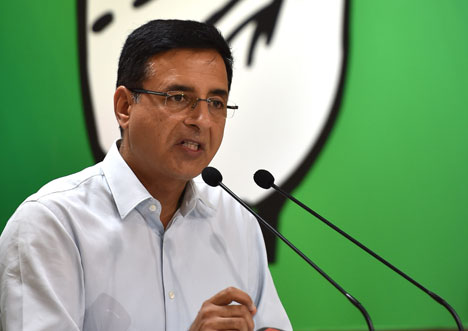The Congress on Thursday asked if a vote of confidence would be constitutionally valid if a party’s right to issue a whip is rendered inoperable.
“Can a court order suspend a portion of the Constitution? How can the whip be enforced on the MLAs when the Supreme Court has nullified the power of the whip?” Congress communications chief Randeep Surjewala asked.
Although a whip issued by the ruling alliance in Karnataka asking all MLAs to attend the Assembly is in force, the Supreme Court had ruled on Wednesday that the rebel MLAs of the alliance could not be compelled to be present.
Former chief minister Siddaramaiah raised the issue in the Assembly on Thursday morning, asking the Speaker to settle this question before the trust vote.
The party’s deputy leader in the Rajya Sabha, Anand Sharma, expressed similar concerns in Parliament and asked the chairman if the judiciary can interfere in the legislature’s functioning.
Many Congress leaders privately lamented that the Supreme Court had laid much greater emphasis on “constitutional balance” than “constitutional morality.”
Surjewala said: “The honourable Supreme Court passed its judgment to balance competing interests and to maintain the ‘constitutional balance’. Because of the BJP’s desperation to subvert constitutional norms and to usurp power at all costs, it may end up, inadvertently, achieving the opposite objective.”
He continued: “Can there be a confidence motion in compliance with the established parliamentary procedure and constitutional norms in the absence of Schedule X of the Constitution. The decision of the Supreme Court has created more questions than it has answered. Can a floor test take place when the whip has been nullified: The court said – ‘the 15 members of the assembly ought not to be compelled to participate in the proceedings of the ongoing session of the House and an option should be given to them that they can take part in the said proceedings or to opt to remain out of the same’.”
He added: “This concern manifested itself in practice today when the rebel MLAs took advantage of the court’s order to avoid participating in the floor test. How can the Congress enforce its rights under Schedule X of the Constitution to issue a whip if some members have been exempted from complying with the constitutionally mandated whip? Can the Congress be bound by a decision to which it is not a party: The Congress was not a party in this case before the court. But the order directly impacts and abrogates the authority of the Congress. This is highly problematic.”
Arguing that the Tenth Schedule exists to punish MLAs who betray the public mandate and the penalty prescribed is disqualification, Surjewala said: “Have we now allowed exceptions to the doctrine of separation of power?”











